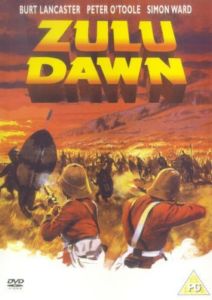#315
Seen It:
Yes
| Burt Lancaster | Col. Durnford |
| Simon Ward | Lt. William Vereker |
| Denholm Elliott | Colonel Pulleine |
| Peter Vaughan | Q.S.M. Bloomfield |
| James Faulkner | Lt. Melvill |
| Christopher Cazenove | Lt. Coghill |
| Bob Hoskins | C.S.M. Williams |
| David Bradley | Pte. Williams (as Dai Bradley) |
| Paul Copley | Cpl. Storey |
| Donald Pickering | Maj. Russell R.A. |
| Director | Douglas Hickox |
| Producer | Nate Kohn |
| Writer | Cy Endfield |
The film's opinion of events is made immediately clear in its title sequence: ebullient African village life presided over by King Cetshwayo is contrasted with aristocratic artifice under the arrogant eye of General Lord Chelmsford (Peter O'Toole). Chelmsford is at the heart of all that goes wrong, initiating the catastrophic battle with an ultimatum made seemingly for the sake of giving his troops something to do. His detached manner leads to one mistake after another and this is wryly illustrated in a moment when neither he nor his officers can be bothered to pronounce the name of the land they're in. That it's a beautiful land none the less is made clear by the superb cinematography, which drinks in the massive open spaces that shrink the British army to a line of red ants.
Splendidly stiff-upper-lipped support comes from a heroic Burt Lancaster and a fluffy, yet gruff, Bob Hoskins. Although the story is less focused and inevitably more diffuse than the concentrated events of Rorke's Drift that followed soon after, Zulu Dawn is an unflinchingly honest depiction of British Imperial diplomacy. --Paul Tonks
